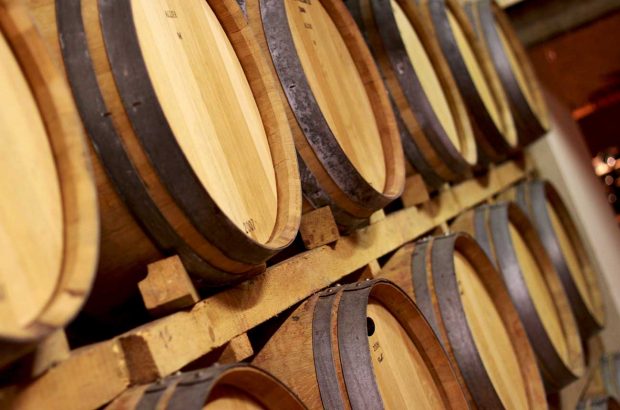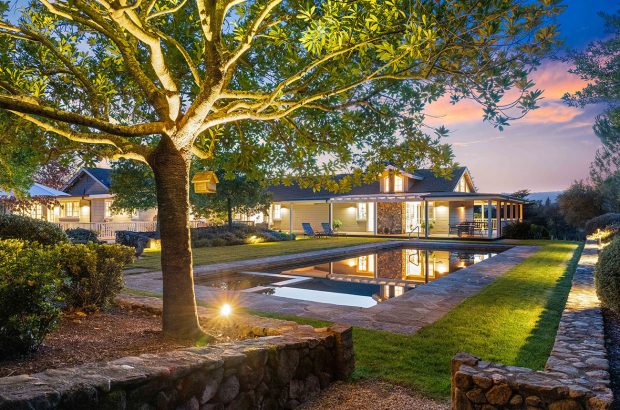For four decades, wine writer Hugh Johnson has been bringing wine to the masses with his wit-washed critiques. ANDREW JEFFORD hears the wine world’s most prolific author reflect on how tastes – both his and those of others – have changed over the years
Who wouldn’t want to be wine writer Hugh Johnson? Not simply for the obvious reasons: the royalty cheques; the Elizabethan residence in Essex; the flat in St James’s; the amply stocked double cellar; the slow-created, lovingly tended garden; the world travel, punctuated by the pop of moist old corks and the flap of sailcloth. No, you could have all of that and still be a rancid old curmudgeon. What’s so appealing about the condition of being Hugh Johnson is that all this comes with assets of much greater importance, namely unquenchable curiosity and a keen sense of fun.
To hear wine writer Hugh Johnson talk about any of his many enthusiasms is to be shown a large and spacious mind hung with vivid, lively pictures, every one of which is beautifully dusted and lit. You feel much the better for passing a little time there.
Which is something we’re all about to get the chance to do. The old master has a new book to offer us, called Wine – A Life Uncorked. It’s not, as rumour had it, strictly autobiographical; instead, the book tracks Johnson’s voyage around a wine world during 40 years of ceaseless change.
‘It was my idea,’ he tells me. ‘Though I’m not sure it was very clear to start with. I love writing about wine, and I had mountains of notes. I just decided to spin them into a story that I felt was coherent about me and what I think about wine.’
We do, nonetheless, get a crisply focused picture of the man’s tastes: he loves good Bordeaux, Champagne, Chablis and German wine; respects any wine made without artifice on an open hill under suitable skies; and finds the new-style, warm-climate powerhouse wines (and, in fact, anything with disproportionately high alcohol levels) unlovely.
Alcohol offenders
‘Everything has to be ultra-ripe nowadays and, consequently, is often too strong,’ he says. ‘I always check alcohol levels, and I know that the lower the level, the more I am going to enjoy the wine. Some of the most sublime wines I have ever tried have been 12% or 12.5%, and that was part of their sublimity. I do, though, think that the balance will be restored. A glut of 15% wine is more serious than a glut of 12% wine, for obvious reasons.’
Does he blame, as some do, the influence of Michel Rolland for this? ‘Wasn’t it [Emile] Peynaud who started it?’ he queries. ‘Whoever it was, it’s clearly gone too far. But Rolland has done some good things – he’s done a lot of different things. I don’t think you can blanket them all together. It’s intriguing but unanswerable to speculate how much global warming has had to do with rising alcohol levels, and how much it will. Anyway, I think I’m going to introduce a Beaufort Scale of wine. My favourite wines will be Force 3–4.’
A minor pleasure of Johnson’s book is to see him put the boot in. Elegantly, of course. ‘No wonder they oak the stuff,’ he writes about a nameless Australian unwooded Chardonnay. ‘A hole rimmed with alcohol’. A Spanish white (also nameless) is ‘Oak, limes; just modern wine. Could be from either hemisphere, or the moon.’
It’s all good fun. But didn’t he fancy letting himself go and lashing out with a little bit more invective? ‘No… I’m not a polemical kind of guy,’ he says. ‘I don’t think that taste should be a great cause of argument. We each have our own taste, and as long as we account for it and make it available for other people to enjoy, that’s all we can do, really.’
I ask wine writer Hugh Johnson to cast his mind back four hectic decades. ‘What did I expect 40 years ago?’ he says. ‘I think I expected the changes in the old wine countries: I saw most of them coming in outline. What I didn’t expect was so many new countries making new wines. I suppose I thought the new countries would succeed by being as like the classics as possible, whereas in fact they’ve headed off in a new direction.
‘There have been lots of surprises, too, though. I didn’t know where Uruguay was 40 years ago! The rejuvenation of Argentine wine amazed me. Canada? Cripes. I underestimated the unfair advantage of anywhere in the world not wrecked by communism over countries like Romania and Bulgaria – or indeed Hungary. How can anyone think that Romanian wine will not one day be as good or better than Chilean wine, for example?
‘I also didn’t anticipate the fact that wine would become Everyman’s wine. Nor,’ he chuckles, ‘the fact that Everyman would not be looking for the same things in wine that I have been. I would never, for example, have foreseen that Riesling would stray out of fashion for so long. Since I went on drinking it, I supposed others would, too.’
Wine writer Hugh Johnson says his own tastes have changed ‘disappointingly little’ in 40 years. ‘Every sip reinforces my… you may call it prejudice; I would simply say opinion. There are satisfactions – not necessarily very highbrow ones – in Bordeaux, and so on, that I simply don’t find elsewhere. It’s no good telling me that “more Cabernet taste” is better. I’m not interested in “Cabernet taste”; I’m interested in the taste of a lovely, light red wine. Indeed, my “personal favourites” list is almost that of the world’s most refreshing wines.’
Is he surprised that neither Coonawarra nor Napa, nor anywhere else, has proved to be the New Bordeaux? ‘Yes. I thought that was what they were working towards. And, in a way, it still is. There are all sorts of intelligent people out there saying, “You know, if only we could get rid of all the alcohol and get to the perfect drink taste rather than the prize winner taste…” The leaders think that. But it’s harder to do.’
The insistent emphasis on the variety in today’s wine world is another source of frustration to him. ‘I don’t want to see Cabernet take over the world, nor do I want to see Sangiovese or Tempranillo or any grape variety take over the world. The celebrity system works against diversity. I would love to taste new flavours, so long as they were not too blatant. But the idea of a long future for Pinot Grigio makes me feel suicidal. What about a crisp, little Sylvaner? Now there’s an underrated grape. It sounds illogical, but selling varieties is incompatible with variety. There are far more terroirs than there are grape flavours (thank God).’
Another source of frustration for Hugh Johnson is the fact that so many wines today are consumed in their early youth. ‘The way that new wines are trotted out as the things to drink is grotesque,’ he says. ‘I went to a dinner recently where Sassicaia 2002 was the featured wine! Why did they create that wine? Not to be drunk now, that’s for sure!’
Indeed, wine writer Hugh Johnson doesn’t even relish tasting young wines meant for long storage much, though he admits that it is often a necessity. ‘I’ve only ever been to the Bordeaux en primeur tastings once, and I came away feeling distressed and ignorant. I couldn’t understand how to make sense of 60 unmade wines in a day.
‘My opinion, had I written it down, would probably have been as good as the next person’s, but I just don’t have the confidence in it. No doubt I’m meant to be drinking 2000 Bordeaux already. But I like the taste of age. I can’t get that any other way. If what you love is decadent, which may well be a definition of what I love, then there’s no quick way to arrive at it. But I’m prepared to wait. I’m out of the ark, no doubt.’
Wine writer Hugh Johnson’s book is seamlessly punctuated with his own, often meditative, tasting notes, for me the greatest ever written. He admits that ‘they’re not the tasting notes that are in fashion today, but then I can’t make head or tail of most of those. Chocolate? It’s in every red – except the ones I taste. The differences between wines are not describable as apples and pears, or at least not the quality differences.’
He also doesn’t view the future with any great equanimity. ‘I have never been able to fathom the relationship between good wine and marketing, but I fear it’s not a positive one. Polarisation, though, is inevitable. Goethe saw it happening: “The rich want the best wine, the poor want lots of wine.” Which leaves the question of “What is the best?” There is no such thing.’
That comment alone should underline the fact that the opinions of Hugh Johnson are very different from those of Robert Parker, his main world rival in the wine-writing stakes. ‘He can hoe his row,’ says Johnson, welcoming those differences… if that was where they began and ended.
Consult the book, though, and you will read that ‘Imperial hegemony lives in Washington and the dictator of taste in Baltimore… Taste in the past was largely a matter of harmless fashion. In American hands, it feels more like a moral crusade. Robert Parker deals in absolutes, and castigates those he sees as backsliders.’
I put it to Johnson that Parker’s life’s work had been predicated on the fact that there is ‘better’ and ‘worse’ in wine, whereas Johnson’s own life’s work was chiefly concerned with the word ‘different’.
‘That is so fundamental,’ he agrees. ‘And also fundamental is the fact that Parker feels he has the right to tick off people who don’t do “better”. Whereas I don’t feel any such right.’
In his book, Johnson describes himself as a ‘relativist. I look for the virtues proper to each wine and enjoy them for what they are. I look on fundamentalist judgements as dangerous and misleading.’ He quotes with approval an anonymous diarist who wrote, ‘I would rather have a worse wine if it had more to say.’
I’ve often wondered who is more influential, Parker or Johnson. Parker’s influence – that of the rigorous critic – is easy to measure because of his use of scores, and because of the way in which those scores influence prices.
Johnson’s influence – that of the avuncular guide who preaches of taste’s relativism and the beauty of difference – is harder to quantify. I suspect, though, it may be even more pervasive than Parker’s, at least among those who buy to drink and dream rather than to invest or collect. I hope so, too.
A Life Uncorked is published by Weidenfeld and Nicolson





